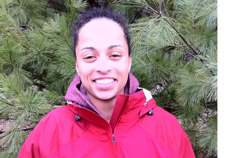Bouvé graduate student named Schweitzer Fellow

Bianca Belcher, a graduate student in the physician assistant program at Northeastern’s Bouvé College of Health Sciences’ physician assistant program, has been named an Albert Schweitzer Fellow, a national honor that enables students to conceptualize and carry out service projects that address the unmet health needs of individuals and communities.
For her project, Belcher will develop and run a health clinic for students at the Edward M. Kennedy Academy for Health Careers, a Boston charter school located on Northeastern University’s campus.
Belcher will run the clinic twice during the year to provide information on sexual health and asthma — two areas that are among the most urgent health needs — for high school students. She recognized the need for such a clinic last year, when physician assistant (PA) students visited the Kennedy Academy to discuss careers in health sciences.
“Our class went over there just to educate the kids on what a PA does, and in the course of talking with them, we were surprised to learn that they have no preventive health care in their school,” Belcher said.
The mission of the Boston-based Albert Schweitzer Fellowship is to develop leaders in service who are dedicated and skilled in addressing the health needs of underserved communities, and whose example influences and inspires others.
Belcher was among 260 Schweitzer Fellows named for the 2011–2012 academic year. Twenty-five of those are from Boston, but Belcher is the only fellow from Northeastern. Her clinic will engage other PA students from Northeastern, giving them real-world experience working in the field with underserved communities.
“It’s a chance to practice clinical care, whether you’re doing a physical exam for asthma or learning to ask those nitty-gritty questions” when working on sexual health issues, Belcher said.
After the first year of the program, Belcher hopes the clinic becomes a larger part of the school, providing students with access to health care several times a week.
“Once we can show that this works, hopefully getting some funding will become easier,” she said.
After she completes her initial year as a fellow, Belcher will become a “Schweitzer for Life,” a network of more than 2,000 health-care professionals who continue to work to address the health needs of underserved populations.
In addition to providing much-needed health care, Belcher said she hopes her presence will help students at the Kennedy Academy gain a broader idea of potential careers in health care.
“A lot of those kids think ‘I either need to be a nurse or I need to be a doctor,’ and that really isn’t the case for everyone,” Belcher said. “There are a lot of options that they might not know about yet.”